St. Thomas Hospital: Personal and Professional Development Report
VerifiedAdded on 2020/10/23
|10
|3049
|430
Report
AI Summary
This report examines personal and professional development within the context of health and social care, specifically referencing St. Thomas's Hospital in London. It explores the influence of personal values and cultural experiences on the role of a care worker, comparing personal principles with the principles of support in healthcare settings. The report also assesses current skills, learning styles, and the creation of a personal development plan with short, medium, and long-term goals. It covers the monitoring and evaluation of the plan's effectiveness, along with an analysis of different professional relationships, including those with service users and coworkers. The report addresses potential dilemmas and conflicts, offering strategies for conflict resolution and the application of various professional models to enhance personal effectiveness in healthcare practice. The report also discusses legislation and policies, and the development of skills in relation to working with others in health and social care.
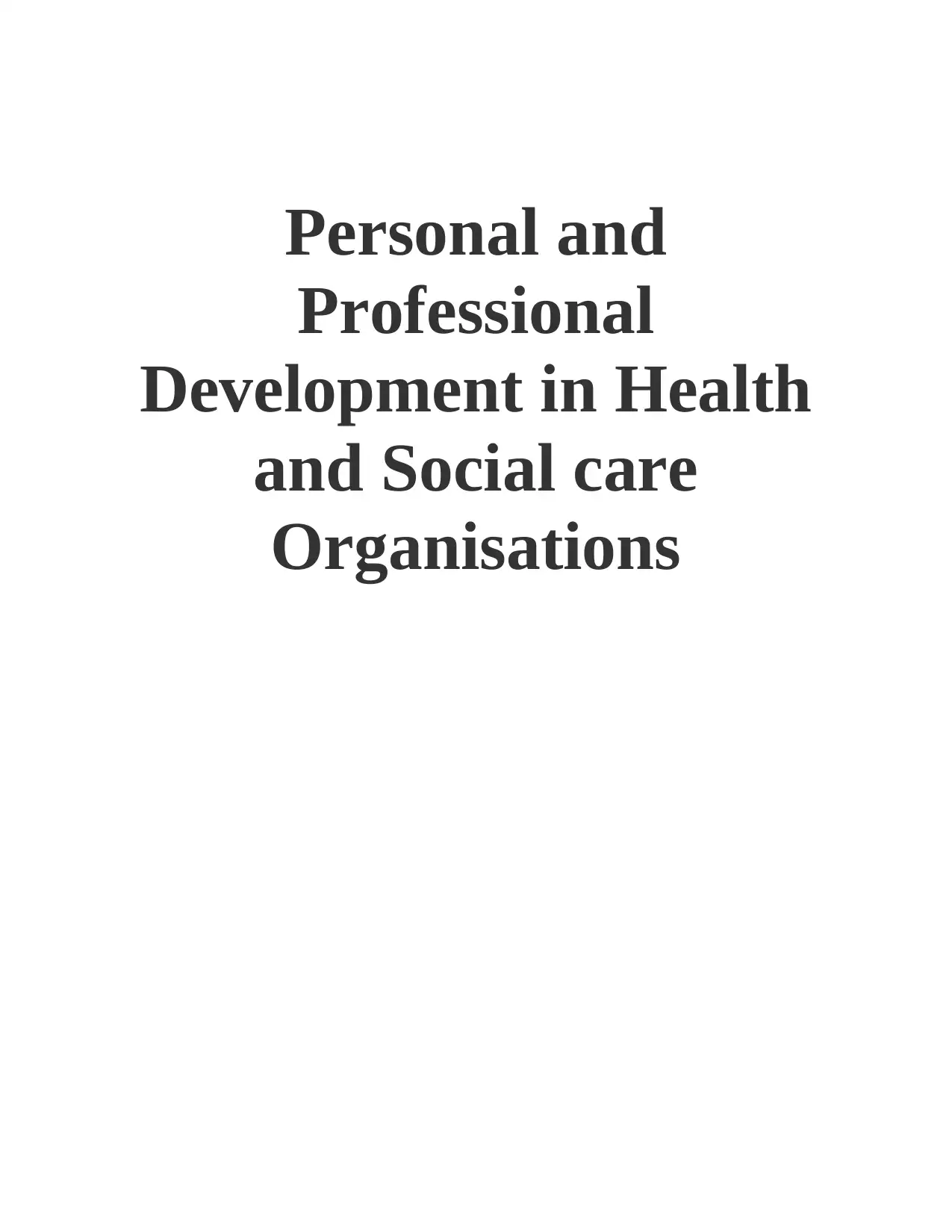
Personal and
Professional
Development in Health
and Social care
Organisations
Professional
Development in Health
and Social care
Organisations
Paraphrase This Document
Need a fresh take? Get an instant paraphrase of this document with our AI Paraphraser
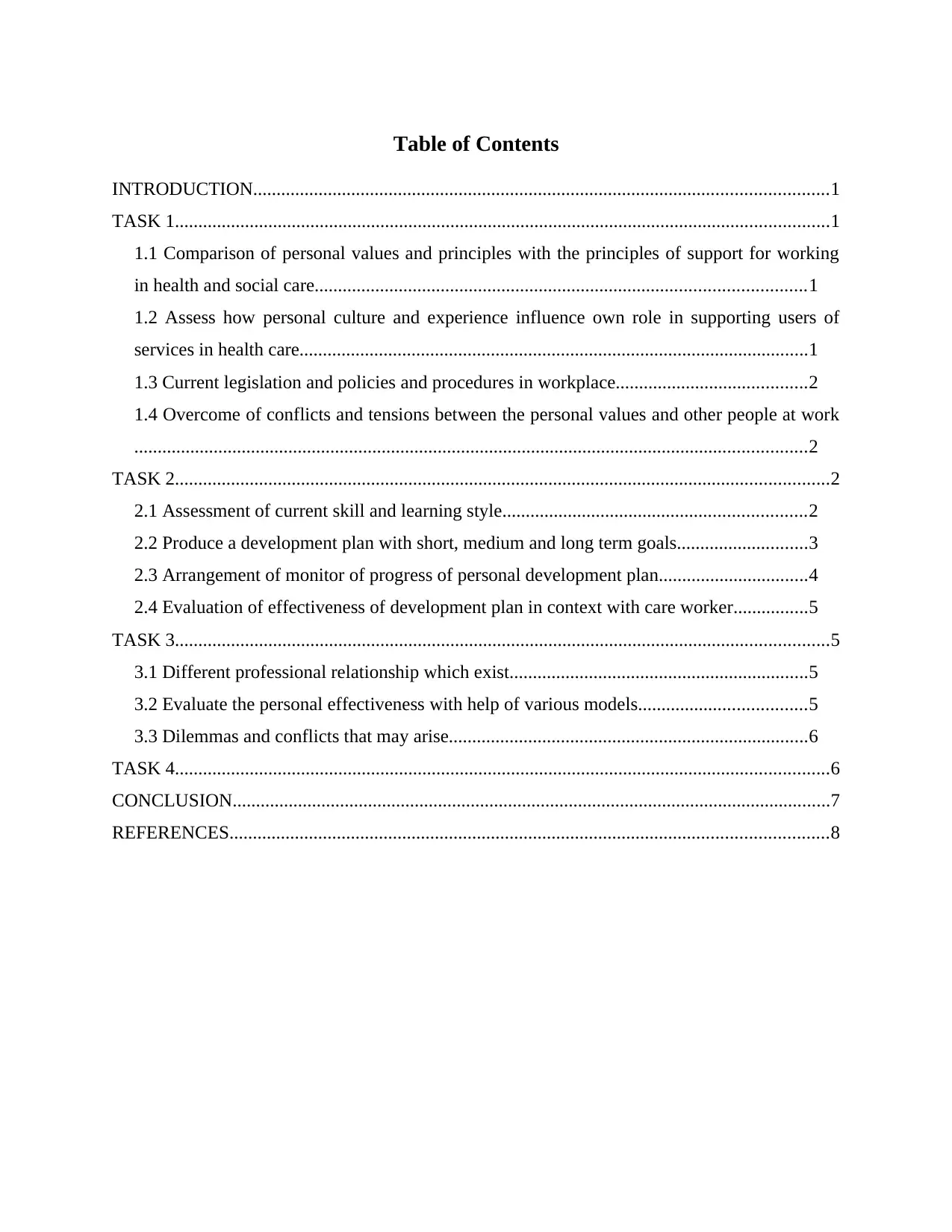
Table of Contents
INTRODUCTION...........................................................................................................................1
TASK 1............................................................................................................................................1
1.1 Comparison of personal values and principles with the principles of support for working
in health and social care.........................................................................................................1
1.2 Assess how personal culture and experience influence own role in supporting users of
services in health care.............................................................................................................1
1.3 Current legislation and policies and procedures in workplace.........................................2
1.4 Overcome of conflicts and tensions between the personal values and other people at work
................................................................................................................................................2
TASK 2............................................................................................................................................2
2.1 Assessment of current skill and learning style.................................................................2
2.2 Produce a development plan with short, medium and long term goals............................3
2.3 Arrangement of monitor of progress of personal development plan................................4
2.4 Evaluation of effectiveness of development plan in context with care worker................5
TASK 3............................................................................................................................................5
3.1 Different professional relationship which exist................................................................5
3.2 Evaluate the personal effectiveness with help of various models....................................5
3.3 Dilemmas and conflicts that may arise.............................................................................6
TASK 4............................................................................................................................................6
CONCLUSION................................................................................................................................7
REFERENCES................................................................................................................................8
INTRODUCTION...........................................................................................................................1
TASK 1............................................................................................................................................1
1.1 Comparison of personal values and principles with the principles of support for working
in health and social care.........................................................................................................1
1.2 Assess how personal culture and experience influence own role in supporting users of
services in health care.............................................................................................................1
1.3 Current legislation and policies and procedures in workplace.........................................2
1.4 Overcome of conflicts and tensions between the personal values and other people at work
................................................................................................................................................2
TASK 2............................................................................................................................................2
2.1 Assessment of current skill and learning style.................................................................2
2.2 Produce a development plan with short, medium and long term goals............................3
2.3 Arrangement of monitor of progress of personal development plan................................4
2.4 Evaluation of effectiveness of development plan in context with care worker................5
TASK 3............................................................................................................................................5
3.1 Different professional relationship which exist................................................................5
3.2 Evaluate the personal effectiveness with help of various models....................................5
3.3 Dilemmas and conflicts that may arise.............................................................................6
TASK 4............................................................................................................................................6
CONCLUSION................................................................................................................................7
REFERENCES................................................................................................................................8
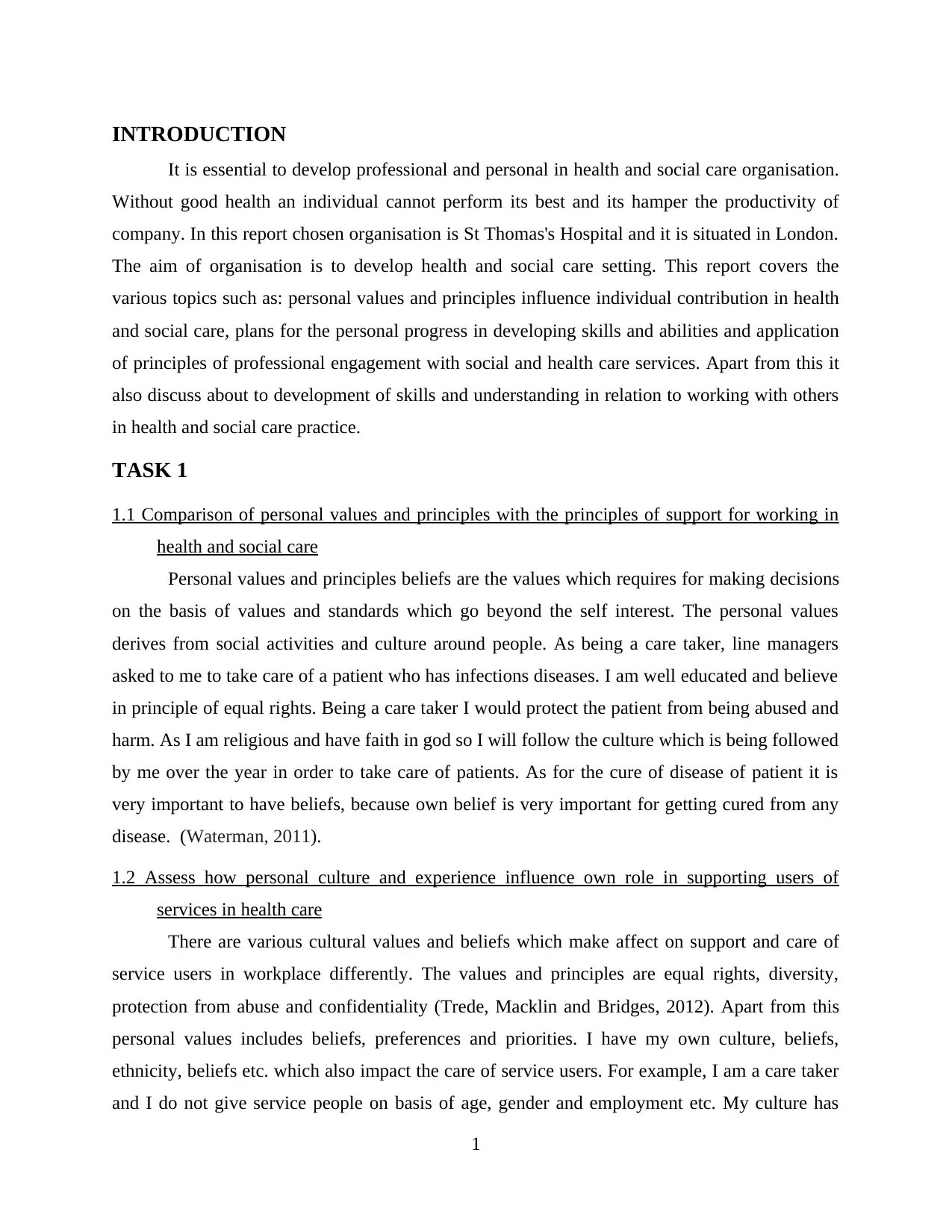
INTRODUCTION
It is essential to develop professional and personal in health and social care organisation.
Without good health an individual cannot perform its best and its hamper the productivity of
company. In this report chosen organisation is St Thomas's Hospital and it is situated in London.
The aim of organisation is to develop health and social care setting. This report covers the
various topics such as: personal values and principles influence individual contribution in health
and social care, plans for the personal progress in developing skills and abilities and application
of principles of professional engagement with social and health care services. Apart from this it
also discuss about to development of skills and understanding in relation to working with others
in health and social care practice.
TASK 1
1.1 Comparison of personal values and principles with the principles of support for working in
health and social care
Personal values and principles beliefs are the values which requires for making decisions
on the basis of values and standards which go beyond the self interest. The personal values
derives from social activities and culture around people. As being a care taker, line managers
asked to me to take care of a patient who has infections diseases. I am well educated and believe
in principle of equal rights. Being a care taker I would protect the patient from being abused and
harm. As I am religious and have faith in god so I will follow the culture which is being followed
by me over the year in order to take care of patients. As for the cure of disease of patient it is
very important to have beliefs, because own belief is very important for getting cured from any
disease. (Waterman, 2011).
1.2 Assess how personal culture and experience influence own role in supporting users of
services in health care
There are various cultural values and beliefs which make affect on support and care of
service users in workplace differently. The values and principles are equal rights, diversity,
protection from abuse and confidentiality (Trede, Macklin and Bridges, 2012). Apart from this
personal values includes beliefs, preferences and priorities. I have my own culture, beliefs,
ethnicity, beliefs etc. which also impact the care of service users. For example, I am a care taker
and I do not give service people on basis of age, gender and employment etc. My culture has
1
It is essential to develop professional and personal in health and social care organisation.
Without good health an individual cannot perform its best and its hamper the productivity of
company. In this report chosen organisation is St Thomas's Hospital and it is situated in London.
The aim of organisation is to develop health and social care setting. This report covers the
various topics such as: personal values and principles influence individual contribution in health
and social care, plans for the personal progress in developing skills and abilities and application
of principles of professional engagement with social and health care services. Apart from this it
also discuss about to development of skills and understanding in relation to working with others
in health and social care practice.
TASK 1
1.1 Comparison of personal values and principles with the principles of support for working in
health and social care
Personal values and principles beliefs are the values which requires for making decisions
on the basis of values and standards which go beyond the self interest. The personal values
derives from social activities and culture around people. As being a care taker, line managers
asked to me to take care of a patient who has infections diseases. I am well educated and believe
in principle of equal rights. Being a care taker I would protect the patient from being abused and
harm. As I am religious and have faith in god so I will follow the culture which is being followed
by me over the year in order to take care of patients. As for the cure of disease of patient it is
very important to have beliefs, because own belief is very important for getting cured from any
disease. (Waterman, 2011).
1.2 Assess how personal culture and experience influence own role in supporting users of
services in health care
There are various cultural values and beliefs which make affect on support and care of
service users in workplace differently. The values and principles are equal rights, diversity,
protection from abuse and confidentiality (Trede, Macklin and Bridges, 2012). Apart from this
personal values includes beliefs, preferences and priorities. I have my own culture, beliefs,
ethnicity, beliefs etc. which also impact the care of service users. For example, I am a care taker
and I do not give service people on basis of age, gender and employment etc. My culture has
1
⊘ This is a preview!⊘
Do you want full access?
Subscribe today to unlock all pages.

Trusted by 1+ million students worldwide
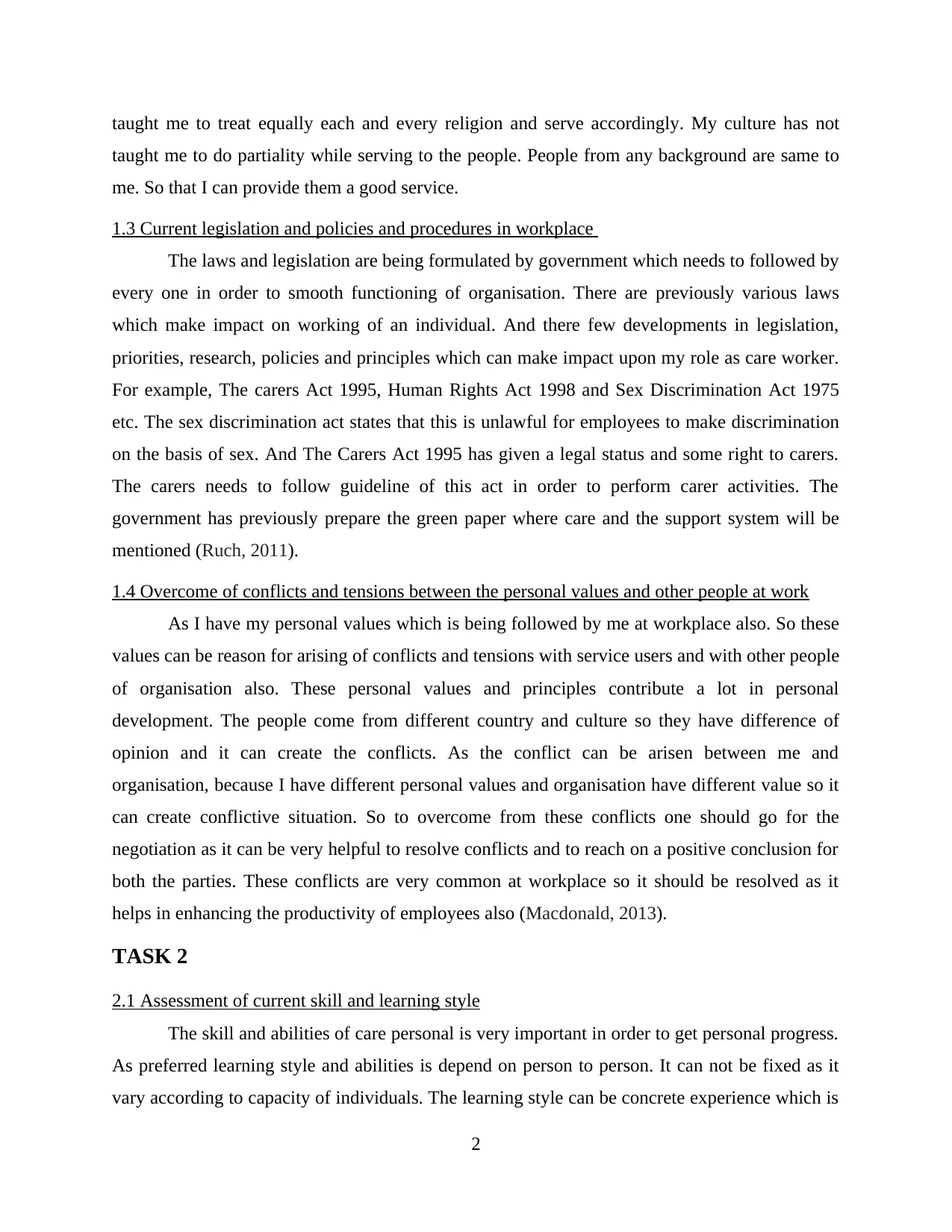
taught me to treat equally each and every religion and serve accordingly. My culture has not
taught me to do partiality while serving to the people. People from any background are same to
me. So that I can provide them a good service.
1.3 Current legislation and policies and procedures in workplace
The laws and legislation are being formulated by government which needs to followed by
every one in order to smooth functioning of organisation. There are previously various laws
which make impact on working of an individual. And there few developments in legislation,
priorities, research, policies and principles which can make impact upon my role as care worker.
For example, The carers Act 1995, Human Rights Act 1998 and Sex Discrimination Act 1975
etc. The sex discrimination act states that this is unlawful for employees to make discrimination
on the basis of sex. And The Carers Act 1995 has given a legal status and some right to carers.
The carers needs to follow guideline of this act in order to perform carer activities. The
government has previously prepare the green paper where care and the support system will be
mentioned (Ruch, 2011).
1.4 Overcome of conflicts and tensions between the personal values and other people at work
As I have my personal values which is being followed by me at workplace also. So these
values can be reason for arising of conflicts and tensions with service users and with other people
of organisation also. These personal values and principles contribute a lot in personal
development. The people come from different country and culture so they have difference of
opinion and it can create the conflicts. As the conflict can be arisen between me and
organisation, because I have different personal values and organisation have different value so it
can create conflictive situation. So to overcome from these conflicts one should go for the
negotiation as it can be very helpful to resolve conflicts and to reach on a positive conclusion for
both the parties. These conflicts are very common at workplace so it should be resolved as it
helps in enhancing the productivity of employees also (Macdonald, 2013).
TASK 2
2.1 Assessment of current skill and learning style
The skill and abilities of care personal is very important in order to get personal progress.
As preferred learning style and abilities is depend on person to person. It can not be fixed as it
vary according to capacity of individuals. The learning style can be concrete experience which is
2
taught me to do partiality while serving to the people. People from any background are same to
me. So that I can provide them a good service.
1.3 Current legislation and policies and procedures in workplace
The laws and legislation are being formulated by government which needs to followed by
every one in order to smooth functioning of organisation. There are previously various laws
which make impact on working of an individual. And there few developments in legislation,
priorities, research, policies and principles which can make impact upon my role as care worker.
For example, The carers Act 1995, Human Rights Act 1998 and Sex Discrimination Act 1975
etc. The sex discrimination act states that this is unlawful for employees to make discrimination
on the basis of sex. And The Carers Act 1995 has given a legal status and some right to carers.
The carers needs to follow guideline of this act in order to perform carer activities. The
government has previously prepare the green paper where care and the support system will be
mentioned (Ruch, 2011).
1.4 Overcome of conflicts and tensions between the personal values and other people at work
As I have my personal values which is being followed by me at workplace also. So these
values can be reason for arising of conflicts and tensions with service users and with other people
of organisation also. These personal values and principles contribute a lot in personal
development. The people come from different country and culture so they have difference of
opinion and it can create the conflicts. As the conflict can be arisen between me and
organisation, because I have different personal values and organisation have different value so it
can create conflictive situation. So to overcome from these conflicts one should go for the
negotiation as it can be very helpful to resolve conflicts and to reach on a positive conclusion for
both the parties. These conflicts are very common at workplace so it should be resolved as it
helps in enhancing the productivity of employees also (Macdonald, 2013).
TASK 2
2.1 Assessment of current skill and learning style
The skill and abilities of care personal is very important in order to get personal progress.
As preferred learning style and abilities is depend on person to person. It can not be fixed as it
vary according to capacity of individuals. The learning style can be concrete experience which is
2
Paraphrase This Document
Need a fresh take? Get an instant paraphrase of this document with our AI Paraphraser
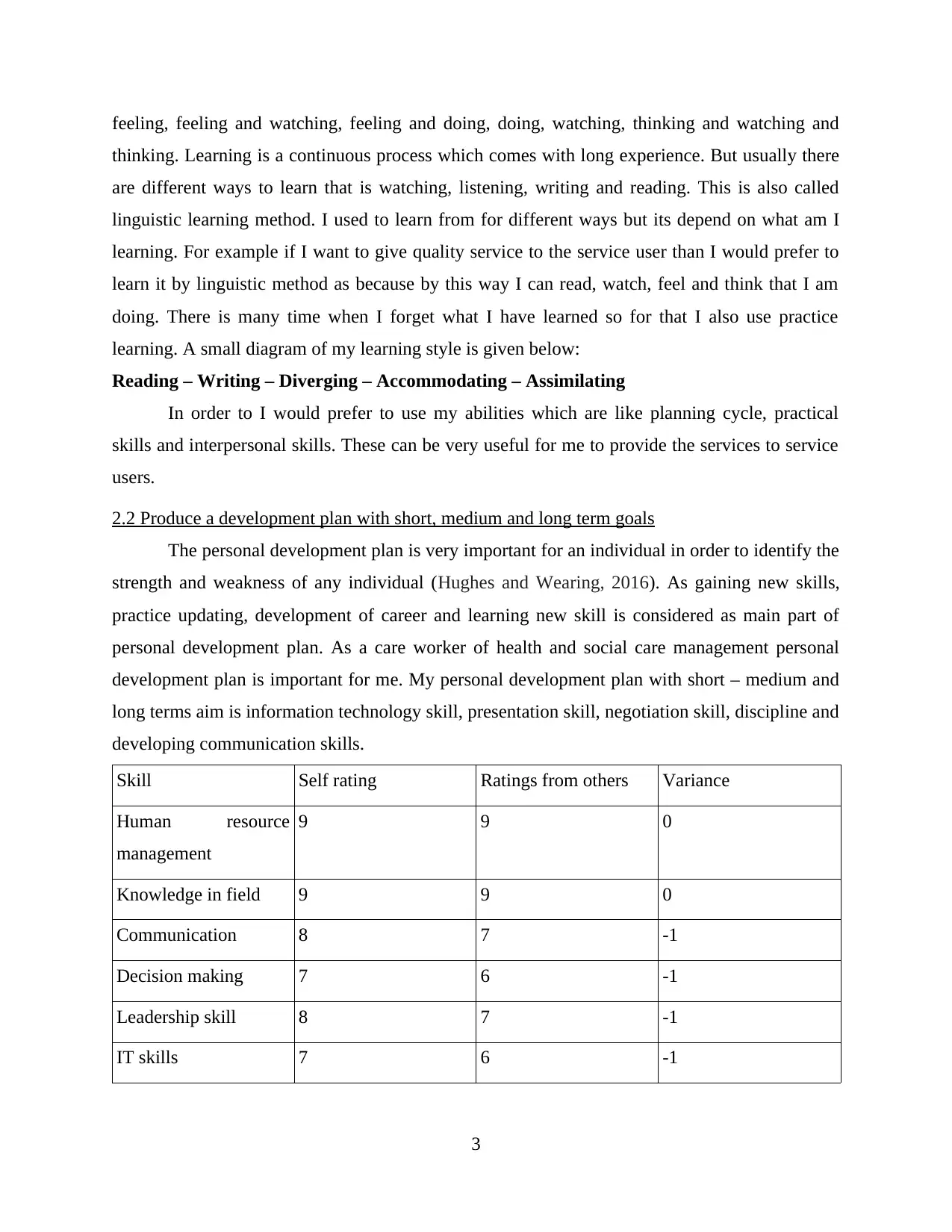
feeling, feeling and watching, feeling and doing, doing, watching, thinking and watching and
thinking. Learning is a continuous process which comes with long experience. But usually there
are different ways to learn that is watching, listening, writing and reading. This is also called
linguistic learning method. I used to learn from for different ways but its depend on what am I
learning. For example if I want to give quality service to the service user than I would prefer to
learn it by linguistic method as because by this way I can read, watch, feel and think that I am
doing. There is many time when I forget what I have learned so for that I also use practice
learning. A small diagram of my learning style is given below:
Reading – Writing – Diverging – Accommodating – Assimilating
In order to I would prefer to use my abilities which are like planning cycle, practical
skills and interpersonal skills. These can be very useful for me to provide the services to service
users.
2.2 Produce a development plan with short, medium and long term goals
The personal development plan is very important for an individual in order to identify the
strength and weakness of any individual (Hughes and Wearing, 2016). As gaining new skills,
practice updating, development of career and learning new skill is considered as main part of
personal development plan. As a care worker of health and social care management personal
development plan is important for me. My personal development plan with short – medium and
long terms aim is information technology skill, presentation skill, negotiation skill, discipline and
developing communication skills.
Skill Self rating Ratings from others Variance
Human resource
management
9 9 0
Knowledge in field 9 9 0
Communication 8 7 -1
Decision making 7 6 -1
Leadership skill 8 7 -1
IT skills 7 6 -1
3
thinking. Learning is a continuous process which comes with long experience. But usually there
are different ways to learn that is watching, listening, writing and reading. This is also called
linguistic learning method. I used to learn from for different ways but its depend on what am I
learning. For example if I want to give quality service to the service user than I would prefer to
learn it by linguistic method as because by this way I can read, watch, feel and think that I am
doing. There is many time when I forget what I have learned so for that I also use practice
learning. A small diagram of my learning style is given below:
Reading – Writing – Diverging – Accommodating – Assimilating
In order to I would prefer to use my abilities which are like planning cycle, practical
skills and interpersonal skills. These can be very useful for me to provide the services to service
users.
2.2 Produce a development plan with short, medium and long term goals
The personal development plan is very important for an individual in order to identify the
strength and weakness of any individual (Hughes and Wearing, 2016). As gaining new skills,
practice updating, development of career and learning new skill is considered as main part of
personal development plan. As a care worker of health and social care management personal
development plan is important for me. My personal development plan with short – medium and
long terms aim is information technology skill, presentation skill, negotiation skill, discipline and
developing communication skills.
Skill Self rating Ratings from others Variance
Human resource
management
9 9 0
Knowledge in field 9 9 0
Communication 8 7 -1
Decision making 7 6 -1
Leadership skill 8 7 -1
IT skills 7 6 -1
3
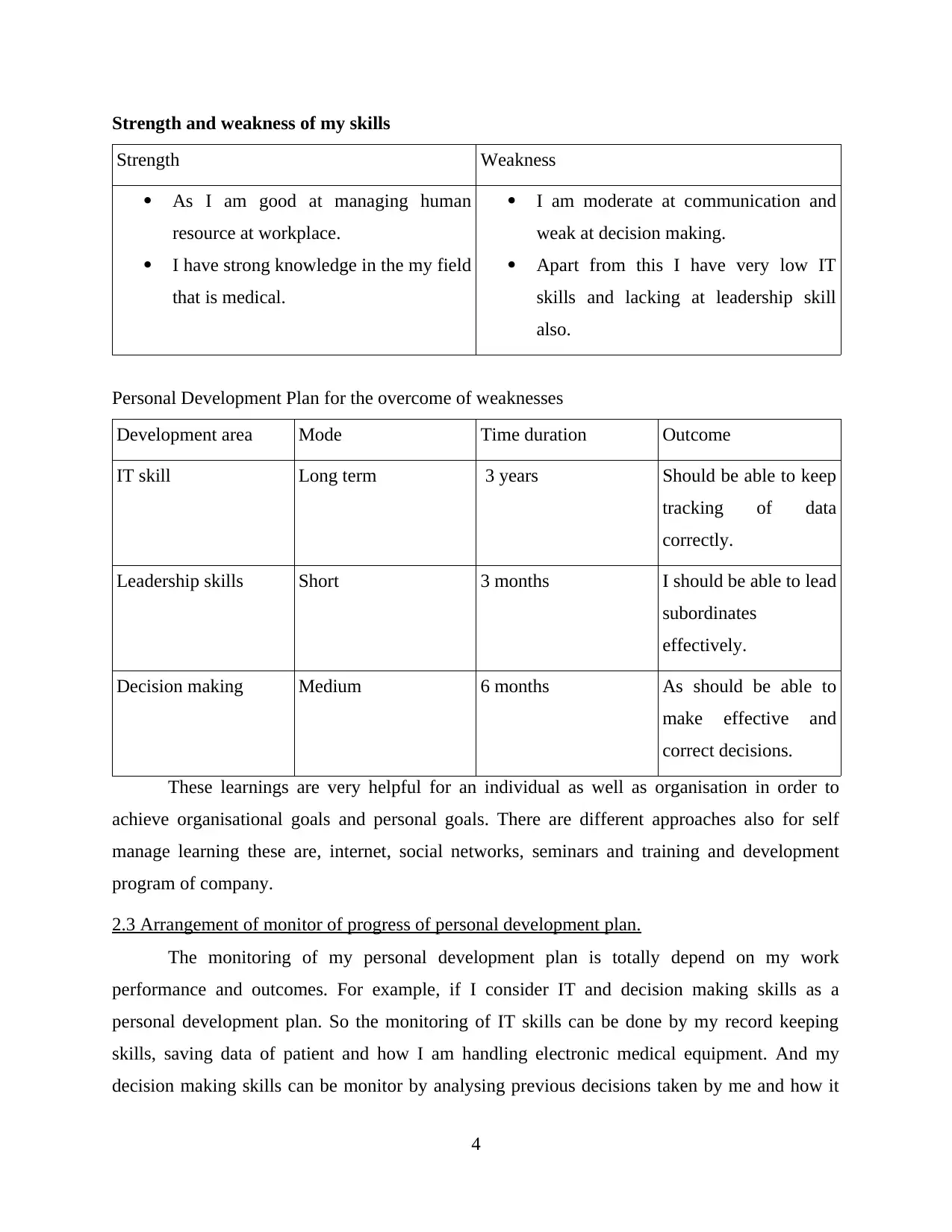
Strength and weakness of my skills
Strength Weakness
As I am good at managing human
resource at workplace.
I have strong knowledge in the my field
that is medical.
I am moderate at communication and
weak at decision making.
Apart from this I have very low IT
skills and lacking at leadership skill
also.
Personal Development Plan for the overcome of weaknesses
Development area Mode Time duration Outcome
IT skill Long term 3 years Should be able to keep
tracking of data
correctly.
Leadership skills Short 3 months I should be able to lead
subordinates
effectively.
Decision making Medium 6 months As should be able to
make effective and
correct decisions.
These learnings are very helpful for an individual as well as organisation in order to
achieve organisational goals and personal goals. There are different approaches also for self
manage learning these are, internet, social networks, seminars and training and development
program of company.
2.3 Arrangement of monitor of progress of personal development plan.
The monitoring of my personal development plan is totally depend on my work
performance and outcomes. For example, if I consider IT and decision making skills as a
personal development plan. So the monitoring of IT skills can be done by my record keeping
skills, saving data of patient and how I am handling electronic medical equipment. And my
decision making skills can be monitor by analysing previous decisions taken by me and how it
4
Strength Weakness
As I am good at managing human
resource at workplace.
I have strong knowledge in the my field
that is medical.
I am moderate at communication and
weak at decision making.
Apart from this I have very low IT
skills and lacking at leadership skill
also.
Personal Development Plan for the overcome of weaknesses
Development area Mode Time duration Outcome
IT skill Long term 3 years Should be able to keep
tracking of data
correctly.
Leadership skills Short 3 months I should be able to lead
subordinates
effectively.
Decision making Medium 6 months As should be able to
make effective and
correct decisions.
These learnings are very helpful for an individual as well as organisation in order to
achieve organisational goals and personal goals. There are different approaches also for self
manage learning these are, internet, social networks, seminars and training and development
program of company.
2.3 Arrangement of monitor of progress of personal development plan.
The monitoring of my personal development plan is totally depend on my work
performance and outcomes. For example, if I consider IT and decision making skills as a
personal development plan. So the monitoring of IT skills can be done by my record keeping
skills, saving data of patient and how I am handling electronic medical equipment. And my
decision making skills can be monitor by analysing previous decisions taken by me and how it
4
⊘ This is a preview!⊘
Do you want full access?
Subscribe today to unlock all pages.

Trusted by 1+ million students worldwide
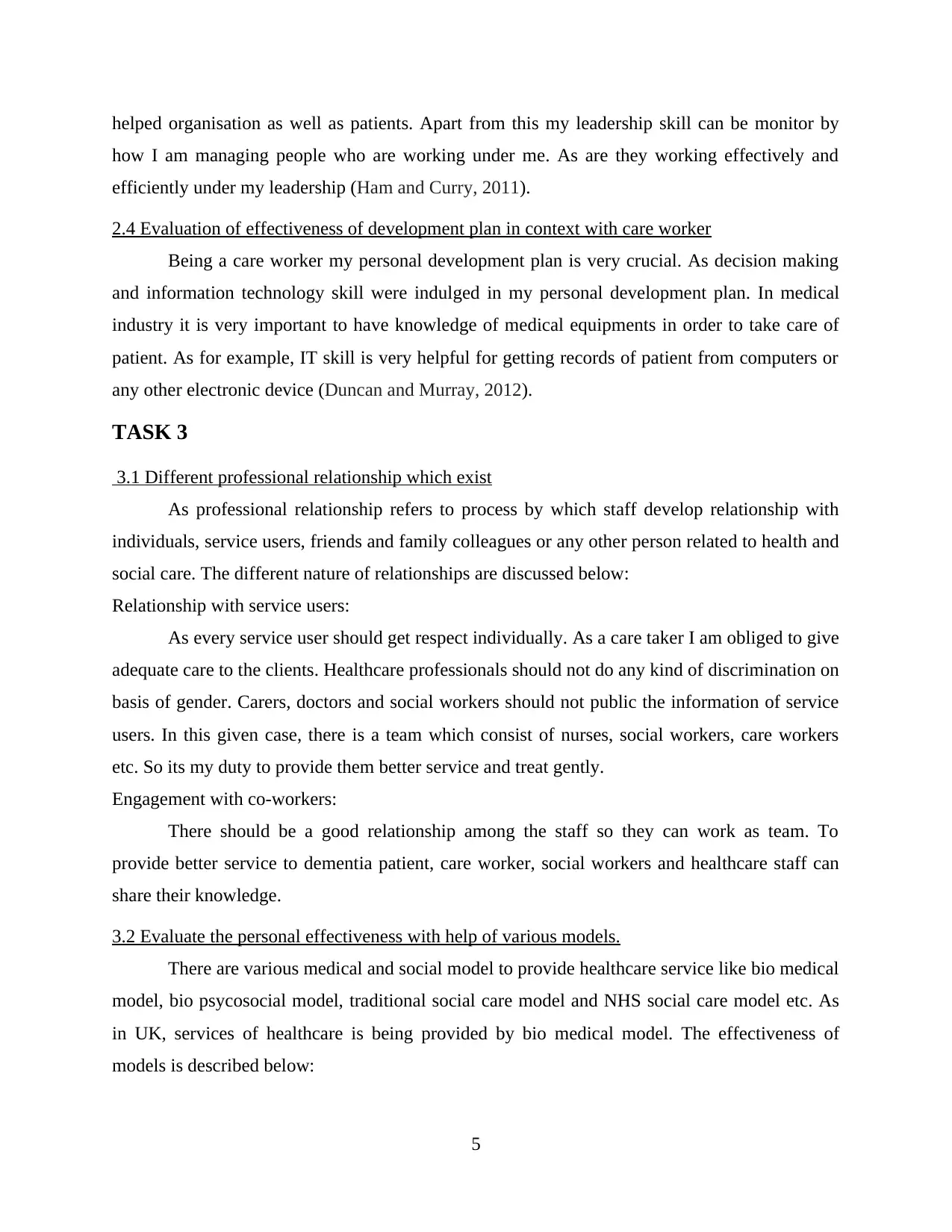
helped organisation as well as patients. Apart from this my leadership skill can be monitor by
how I am managing people who are working under me. As are they working effectively and
efficiently under my leadership (Ham and Curry, 2011).
2.4 Evaluation of effectiveness of development plan in context with care worker
Being a care worker my personal development plan is very crucial. As decision making
and information technology skill were indulged in my personal development plan. In medical
industry it is very important to have knowledge of medical equipments in order to take care of
patient. As for example, IT skill is very helpful for getting records of patient from computers or
any other electronic device (Duncan and Murray, 2012).
TASK 3
3.1 Different professional relationship which exist
As professional relationship refers to process by which staff develop relationship with
individuals, service users, friends and family colleagues or any other person related to health and
social care. The different nature of relationships are discussed below:
Relationship with service users:
As every service user should get respect individually. As a care taker I am obliged to give
adequate care to the clients. Healthcare professionals should not do any kind of discrimination on
basis of gender. Carers, doctors and social workers should not public the information of service
users. In this given case, there is a team which consist of nurses, social workers, care workers
etc. So its my duty to provide them better service and treat gently.
Engagement with co-workers:
There should be a good relationship among the staff so they can work as team. To
provide better service to dementia patient, care worker, social workers and healthcare staff can
share their knowledge.
3.2 Evaluate the personal effectiveness with help of various models.
There are various medical and social model to provide healthcare service like bio medical
model, bio psycosocial model, traditional social care model and NHS social care model etc. As
in UK, services of healthcare is being provided by bio medical model. The effectiveness of
models is described below:
5
how I am managing people who are working under me. As are they working effectively and
efficiently under my leadership (Ham and Curry, 2011).
2.4 Evaluation of effectiveness of development plan in context with care worker
Being a care worker my personal development plan is very crucial. As decision making
and information technology skill were indulged in my personal development plan. In medical
industry it is very important to have knowledge of medical equipments in order to take care of
patient. As for example, IT skill is very helpful for getting records of patient from computers or
any other electronic device (Duncan and Murray, 2012).
TASK 3
3.1 Different professional relationship which exist
As professional relationship refers to process by which staff develop relationship with
individuals, service users, friends and family colleagues or any other person related to health and
social care. The different nature of relationships are discussed below:
Relationship with service users:
As every service user should get respect individually. As a care taker I am obliged to give
adequate care to the clients. Healthcare professionals should not do any kind of discrimination on
basis of gender. Carers, doctors and social workers should not public the information of service
users. In this given case, there is a team which consist of nurses, social workers, care workers
etc. So its my duty to provide them better service and treat gently.
Engagement with co-workers:
There should be a good relationship among the staff so they can work as team. To
provide better service to dementia patient, care worker, social workers and healthcare staff can
share their knowledge.
3.2 Evaluate the personal effectiveness with help of various models.
There are various medical and social model to provide healthcare service like bio medical
model, bio psycosocial model, traditional social care model and NHS social care model etc. As
in UK, services of healthcare is being provided by bio medical model. The effectiveness of
models is described below:
5
Paraphrase This Document
Need a fresh take? Get an instant paraphrase of this document with our AI Paraphraser
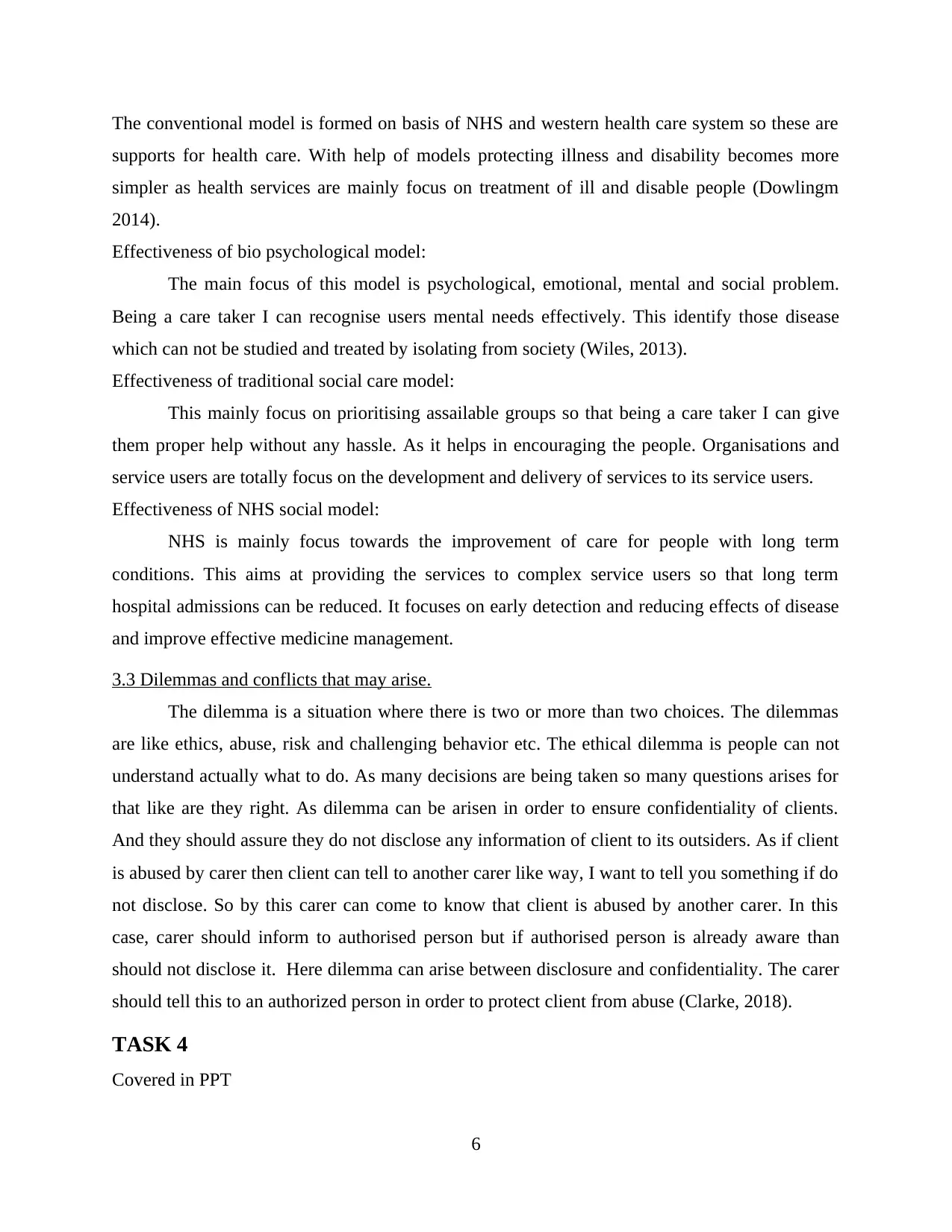
The conventional model is formed on basis of NHS and western health care system so these are
supports for health care. With help of models protecting illness and disability becomes more
simpler as health services are mainly focus on treatment of ill and disable people (Dowlingm
2014).
Effectiveness of bio psychological model:
The main focus of this model is psychological, emotional, mental and social problem.
Being a care taker I can recognise users mental needs effectively. This identify those disease
which can not be studied and treated by isolating from society (Wiles, 2013).
Effectiveness of traditional social care model:
This mainly focus on prioritising assailable groups so that being a care taker I can give
them proper help without any hassle. As it helps in encouraging the people. Organisations and
service users are totally focus on the development and delivery of services to its service users.
Effectiveness of NHS social model:
NHS is mainly focus towards the improvement of care for people with long term
conditions. This aims at providing the services to complex service users so that long term
hospital admissions can be reduced. It focuses on early detection and reducing effects of disease
and improve effective medicine management.
3.3 Dilemmas and conflicts that may arise.
The dilemma is a situation where there is two or more than two choices. The dilemmas
are like ethics, abuse, risk and challenging behavior etc. The ethical dilemma is people can not
understand actually what to do. As many decisions are being taken so many questions arises for
that like are they right. As dilemma can be arisen in order to ensure confidentiality of clients.
And they should assure they do not disclose any information of client to its outsiders. As if client
is abused by carer then client can tell to another carer like way, I want to tell you something if do
not disclose. So by this carer can come to know that client is abused by another carer. In this
case, carer should inform to authorised person but if authorised person is already aware than
should not disclose it. Here dilemma can arise between disclosure and confidentiality. The carer
should tell this to an authorized person in order to protect client from abuse (Clarke, 2018).
TASK 4
Covered in PPT
6
supports for health care. With help of models protecting illness and disability becomes more
simpler as health services are mainly focus on treatment of ill and disable people (Dowlingm
2014).
Effectiveness of bio psychological model:
The main focus of this model is psychological, emotional, mental and social problem.
Being a care taker I can recognise users mental needs effectively. This identify those disease
which can not be studied and treated by isolating from society (Wiles, 2013).
Effectiveness of traditional social care model:
This mainly focus on prioritising assailable groups so that being a care taker I can give
them proper help without any hassle. As it helps in encouraging the people. Organisations and
service users are totally focus on the development and delivery of services to its service users.
Effectiveness of NHS social model:
NHS is mainly focus towards the improvement of care for people with long term
conditions. This aims at providing the services to complex service users so that long term
hospital admissions can be reduced. It focuses on early detection and reducing effects of disease
and improve effective medicine management.
3.3 Dilemmas and conflicts that may arise.
The dilemma is a situation where there is two or more than two choices. The dilemmas
are like ethics, abuse, risk and challenging behavior etc. The ethical dilemma is people can not
understand actually what to do. As many decisions are being taken so many questions arises for
that like are they right. As dilemma can be arisen in order to ensure confidentiality of clients.
And they should assure they do not disclose any information of client to its outsiders. As if client
is abused by carer then client can tell to another carer like way, I want to tell you something if do
not disclose. So by this carer can come to know that client is abused by another carer. In this
case, carer should inform to authorised person but if authorised person is already aware than
should not disclose it. Here dilemma can arise between disclosure and confidentiality. The carer
should tell this to an authorized person in order to protect client from abuse (Clarke, 2018).
TASK 4
Covered in PPT
6
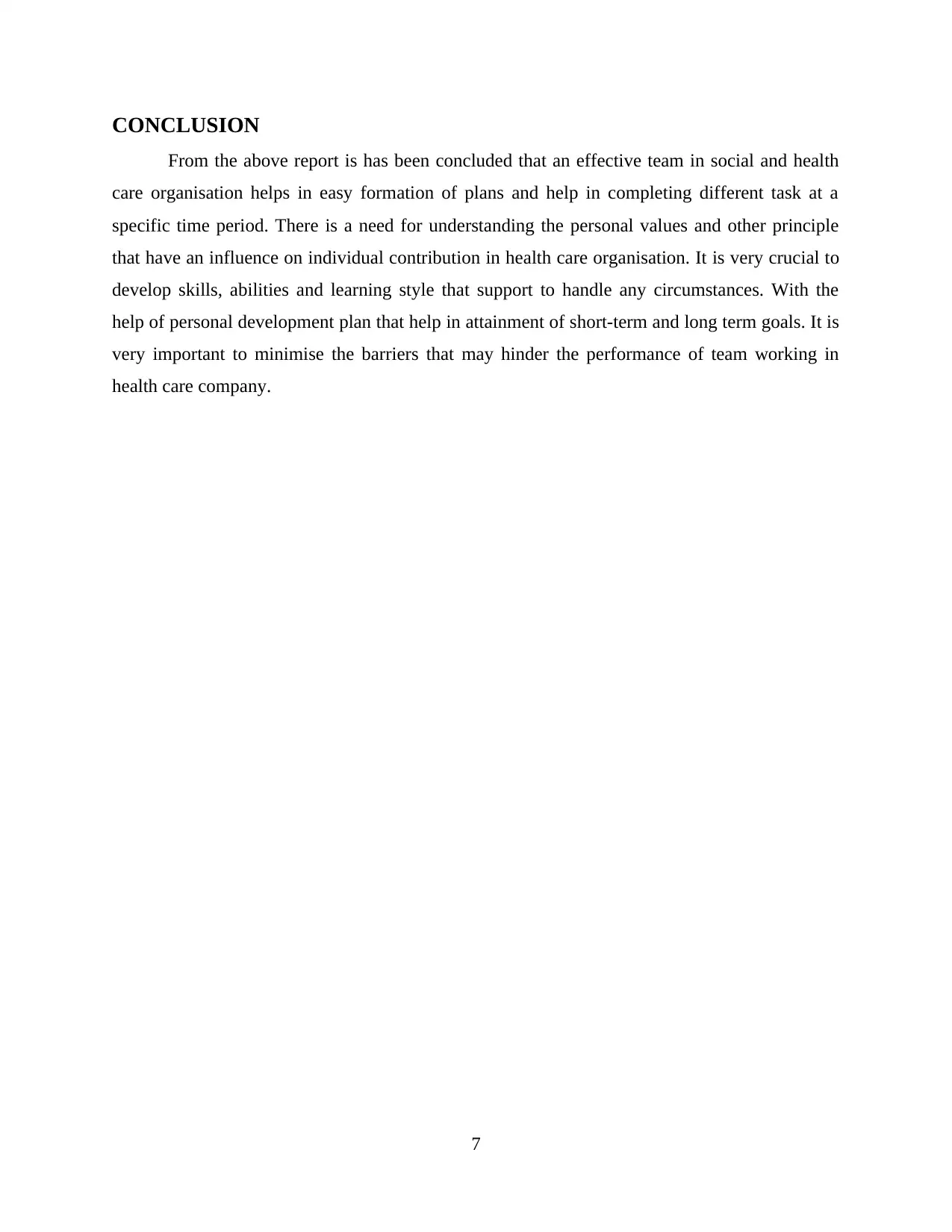
CONCLUSION
From the above report is has been concluded that an effective team in social and health
care organisation helps in easy formation of plans and help in completing different task at a
specific time period. There is a need for understanding the personal values and other principle
that have an influence on individual contribution in health care organisation. It is very crucial to
develop skills, abilities and learning style that support to handle any circumstances. With the
help of personal development plan that help in attainment of short-term and long term goals. It is
very important to minimise the barriers that may hinder the performance of team working in
health care company.
7
From the above report is has been concluded that an effective team in social and health
care organisation helps in easy formation of plans and help in completing different task at a
specific time period. There is a need for understanding the personal values and other principle
that have an influence on individual contribution in health care organisation. It is very crucial to
develop skills, abilities and learning style that support to handle any circumstances. With the
help of personal development plan that help in attainment of short-term and long term goals. It is
very important to minimise the barriers that may hinder the performance of team working in
health care company.
7
⊘ This is a preview!⊘
Do you want full access?
Subscribe today to unlock all pages.

Trusted by 1+ million students worldwide
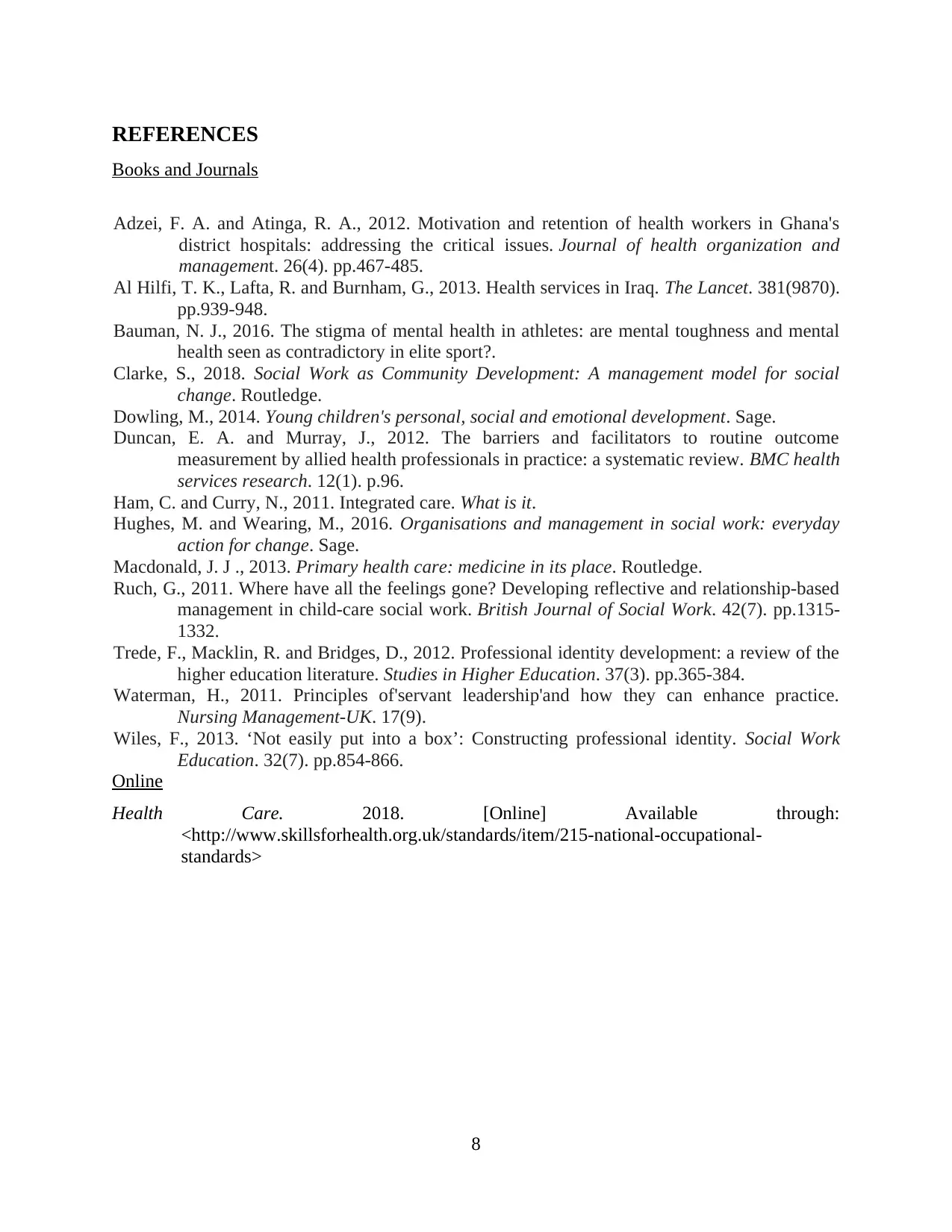
REFERENCES
Books and Journals
Adzei, F. A. and Atinga, R. A., 2012. Motivation and retention of health workers in Ghana's
district hospitals: addressing the critical issues. Journal of health organization and
management. 26(4). pp.467-485.
Al Hilfi, T. K., Lafta, R. and Burnham, G., 2013. Health services in Iraq. The Lancet. 381(9870).
pp.939-948.
Bauman, N. J., 2016. The stigma of mental health in athletes: are mental toughness and mental
health seen as contradictory in elite sport?.
Clarke, S., 2018. Social Work as Community Development: A management model for social
change. Routledge.
Dowling, M., 2014. Young children's personal, social and emotional development. Sage.
Duncan, E. A. and Murray, J., 2012. The barriers and facilitators to routine outcome
measurement by allied health professionals in practice: a systematic review. BMC health
services research. 12(1). p.96.
Ham, C. and Curry, N., 2011. Integrated care. What is it.
Hughes, M. and Wearing, M., 2016. Organisations and management in social work: everyday
action for change. Sage.
Macdonald, J. J ., 2013. Primary health care: medicine in its place. Routledge.
Ruch, G., 2011. Where have all the feelings gone? Developing reflective and relationship-based
management in child-care social work. British Journal of Social Work. 42(7). pp.1315-
1332.
Trede, F., Macklin, R. and Bridges, D., 2012. Professional identity development: a review of the
higher education literature. Studies in Higher Education. 37(3). pp.365-384.
Waterman, H., 2011. Principles of'servant leadership'and how they can enhance practice.
Nursing Management-UK. 17(9).
Wiles, F., 2013. ‘Not easily put into a box’: Constructing professional identity. Social Work
Education. 32(7). pp.854-866.
Online
Health Care. 2018. [Online] Available through:
<http://www.skillsforhealth.org.uk/standards/item/215-national-occupational-
standards>
8
Books and Journals
Adzei, F. A. and Atinga, R. A., 2012. Motivation and retention of health workers in Ghana's
district hospitals: addressing the critical issues. Journal of health organization and
management. 26(4). pp.467-485.
Al Hilfi, T. K., Lafta, R. and Burnham, G., 2013. Health services in Iraq. The Lancet. 381(9870).
pp.939-948.
Bauman, N. J., 2016. The stigma of mental health in athletes: are mental toughness and mental
health seen as contradictory in elite sport?.
Clarke, S., 2018. Social Work as Community Development: A management model for social
change. Routledge.
Dowling, M., 2014. Young children's personal, social and emotional development. Sage.
Duncan, E. A. and Murray, J., 2012. The barriers and facilitators to routine outcome
measurement by allied health professionals in practice: a systematic review. BMC health
services research. 12(1). p.96.
Ham, C. and Curry, N., 2011. Integrated care. What is it.
Hughes, M. and Wearing, M., 2016. Organisations and management in social work: everyday
action for change. Sage.
Macdonald, J. J ., 2013. Primary health care: medicine in its place. Routledge.
Ruch, G., 2011. Where have all the feelings gone? Developing reflective and relationship-based
management in child-care social work. British Journal of Social Work. 42(7). pp.1315-
1332.
Trede, F., Macklin, R. and Bridges, D., 2012. Professional identity development: a review of the
higher education literature. Studies in Higher Education. 37(3). pp.365-384.
Waterman, H., 2011. Principles of'servant leadership'and how they can enhance practice.
Nursing Management-UK. 17(9).
Wiles, F., 2013. ‘Not easily put into a box’: Constructing professional identity. Social Work
Education. 32(7). pp.854-866.
Online
Health Care. 2018. [Online] Available through:
<http://www.skillsforhealth.org.uk/standards/item/215-national-occupational-
standards>
8
1 out of 10
Related Documents
Your All-in-One AI-Powered Toolkit for Academic Success.
+13062052269
info@desklib.com
Available 24*7 on WhatsApp / Email
![[object Object]](/_next/static/media/star-bottom.7253800d.svg)
Unlock your academic potential
Copyright © 2020–2026 A2Z Services. All Rights Reserved. Developed and managed by ZUCOL.





